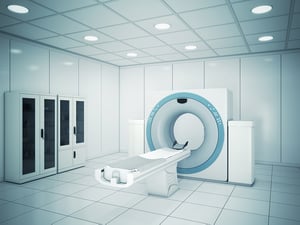Healthcare professionals and patients rely on magnetic resonance imaging (MRI) technology to examine soft tissues and organs in the body to detect a variety of issues, from degenerative diseases to tumors, in a non-invasive manner. To do this, the MRI machine uses a strong magnetic field and computer-generated radio waves to produce cross-sectional images. Thus, the quality of the MRI depends on the uniformity of the magnetic field – even the smallest trace of magnetism inside an MRI scanner can disrupt the field and degrade the quality of an MRI image.
How an MRI Works at a High Level

The MRI machines we are accustomed to today are based on the principle of nuclear magnetic resonance (NMR). More specifically, the molecules that make up the human body contain hydrogen, and the nucleus of the hydrogen atom has a single proton that behaves like a magnet with a north and south pole. When a magnetic field is applied, their spins, which is a property of subatomic particles, arrange uniformly. When a patient is positioned inside the MRI scanner tube, the spins of the protons in the body’s molecules line up, facing the same direction, like a marching band practicing on a football field.
When a short, computer-generated RF signal is applied to a portion of the uniform field, those protons receive a “nudge” and break formation, like a stray football heading for the marching band. After the interruption, the protons return to their state of alignment. In the process of realigning, energy is emitted. That energy can be measured and used to distinguish between different types of molecules and their locations.
However, even the slightest variation in the magnetic field will cause protons to align differently, which means they will not respond the same way to the stimulus. These differences confuse the detection algorithms. In practice, these irregular detections, excessive signal noise, or random variations in signal intensity produce granular images. A low-quality image may lead to a mistaken diagnosis and, consequently, misguided treatment selections.
Component Material Choice is Paramount
Magnetic components inside the MRI scanner tunnel can alter the field’s homogeneity, and even the smallest trace of magnetism could affect the quality of the MRI image. Therefore, it’s important for medical device manufacturers to look for components, including fixed capacitors, trimmer capacitors, inductors, and connectors, that use high-purity metals that exhibit no measurable magnetism.
Compliance with this parameter starts with strict traceability and testing regimens and a foundation of materials science expertise. For example, many capacitors are designed with a nickel barrier finish to maintain solderability; however, nickel’s magnetic properties disqualify the capacitor from being used in imaging applications. Similarly, commercial brass, another commonly used material, is also not acceptable for these applications.
Due to the severe non-magnetism requirements necessary for MRI machines, Knowles Precision Devices uses only high-purity metals that exhibit no measurable magnetism. We produce our non-magnetic capacitors with silver/palladium (Ag/Pd) terminations and also offer custom hardware for any necessary non-magnetic adaptations. Our non-magnetic alternatives are lead free while avoiding increased soldering temperatures and leaching problems. Our strict traceability and testing regimes ensure this essential parameter of offering truly non-magnetic components is met. These non-magnetic terminations are offered with select non-magnetic C0G, high Q, and X7R dielectrics to provide a fully non-magnetic component.
 A sampling of non-magnetic capacitors offered by Knowles Precision Devices.
A sampling of non-magnetic capacitors offered by Knowles Precision Devices.
This amount of care on the component level prevents distortion and minimizes the need for image correction. As a result, clinicians can reliably investigate and diagnose patients without the need for more invasive procedures.
Learn more about Knowles Precision Devices’ non-magnetic component offerings.

